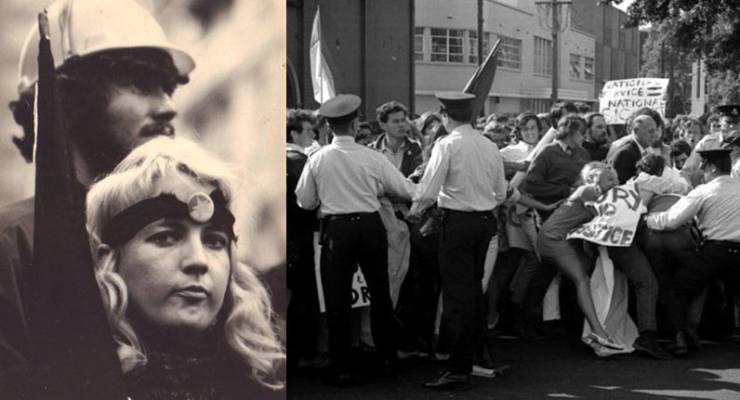
(L) the writer wearing a National Liberation Front badge, (R) Sydney anti-conscription protest 1968.
Fifty years ago this month, French students marched out of the prestigious Sorbonne University to be joined on the streets by striking workers. The Paris Spring had begun.
It does not need to be said that this year is the 50th anniversary of 1968. Nadia Wheatley and I are writing a book about it. In it, she uses the famous Wordsworth quote about that other French revolution: it was “bliss to be alive… but to be young was very heaven”.
When we mention 1968 to anyone over 60 they nod and laugh and then insist on telling you their “1968 story”. My story was that in that year I lost my religion, became a socialist, was arrested three times and became an ASIO target. I have always said it was all downhill from there.

The writer being arrested protesting “pro war” John Wayne movie The Green Berets, August 1968.
On the world stage there was the Paris Spring, the Russian invasion of Czechoslovakia, the assassinations of Bobby Kennedy and Martin Luther King Jr., continuing civil rights agitation in America and the ongoing trauma of the Vietnam War. In Britain, against a background of student sit-ins and flower power there was Enoch Powell’s “Rivers of Blood” speech. And at the Olympics there was that black power protest.
In Australia, 20 years of conservative rule at last looked like it was coming to an end. The dying days of Menzies had transitioned into the stodgy misrule of the Gorton era. “Student power” which had erupted around the world also erupted in Australia and anti-Vietnam demonstrations were at their height. The Communist Party of Australia which had led the resistance to the Vietnam War was shell shocked by the Russian invasion of Czechoslovakia and communist parties everywhere began to splinter.
1968 heralded the rise of the “New Left”. Mainly led by students, it was a movement which had consciously detached itself from the politics of the old Stalinist Left. This new progressive voice talked about personal liberation and democratic structures.
“The personal is the political” and “the end does not justify the means” were our catch cries. We believed in participatory democracy, rotating chairs and meetings… oh God, endless meetings. It was also the year that very nascent movements around Aboriginal rights, women’s rights and even gay rights began to appear.
The same students who wore Che badges, chanted “Ho Ho Ho Chi Minh, dare to struggle dare to win” and barricaded themselves into National Service offices were also arrested outside the Polish consulate in Sydney protesting the Czech invasion. This anti-Stalinism totally confused ASIO which just listed us all as the enemy and in my case alerted MI6 that I was proposing to visit Britain and that my crime had been “demonstrating against the Russian invasion of Czechoslovakia”.
In Australia we were much more politically focused than our American comrades. Some pretty weird activity was taking place on the west coast of America. Haight-Ashbury was not just a crossroads in San Francisco, it was a state of mind — a mixture of psychedelic mayhem, student sit-ins and strange organisations. The International Werewolf Conspiracy and the “free money movement” are just two of these that spring to mind.
French president Charles De Gaulle famously declared that the international student revolt was orchestrated centrally, however nothing could have been orchestrated in those chaotic times.
The protest movement in each country was vibrant and intoxicating, but very different. There was no equivalent in Australia of violent manifestations of resistance such as the Weather Underground in America or the Red Army Faction in Germany.
There will be all sorts of anniversaries and events to celebrate 1968 during this year and there is even a seminar series organised for this purpose. It is ironic that these seminars are organised by veteran Greens Senator Lee Rhiannon who joined the Socialist Party of Australia, the only political grouping in the country which supported the Russian invasion (though she has stated she personally did not support it and actively protested). Fifty years is a long time in politics.
For more on the 1968 Paris protests, read Helen Razer’s view of its legacy







Good article although I note that you can’t resist a dig at LR for her past so in the same spirit here is my addendum. Excellent article by a participant in the radical events of the sixties and seventies who went on to provide cover for a range of evil bastards headed by Eddie Obeid.
I enjoyed the RN prog on Paris 68 topped & tailed by the writer but was pulled up by her dismissal of Cohn-Bendit MEP today as “..a fat little man in an anorak”.
Everyone grows older but some people also grow up.
Idealists of the 60’s, became the greedy opportunists of the 80’s and now like to sentimentalise publically about their greatness in days of yore.
Boring stuff.